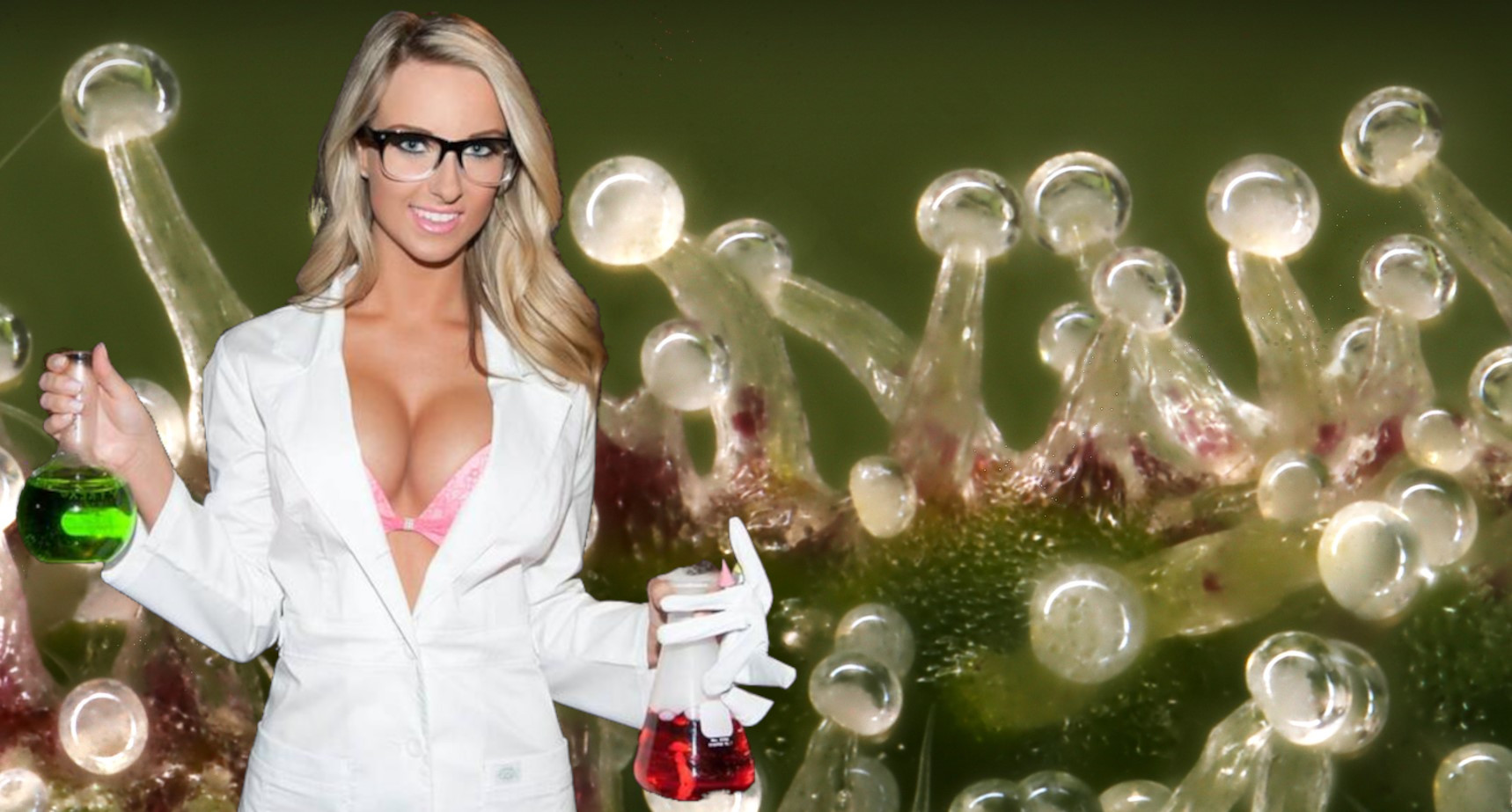THC – Totally Hard-Core!
Well, actually it’s tetrahydrocannabinol. Here’s what it looks like for those who paid attention to science.
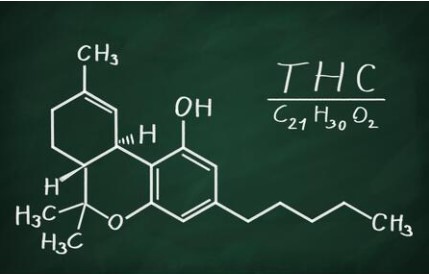
This is about the recreational rather than medicinal use of cannabis. The difference? There’s a lot of science and sadly pseudoscience around the medicinal use of cannabis. It’s a very complex area and there is much more to be learned before it’s properly understood. The science of getting stoned, however, is much more straightforward and that’s what I’ll be talking about.
We’ve known since 1965 that the only cannabinoid that is capable of getting you stoned is tetrahydrocannabinol (THC). If you purify and consume any of the other 120+ cannabinoids found in the marijuana you won’t get high.
THC is very similar to a group of neurotransmitters found in Mammal brains, neurotransmitters carry signals between nerve cells. In the case of THC, the neurotransmitters it mimics are called endocannabinoids. The groups of nerve cells that produce endocannabinoids are called the endocannabinoid system and are found in parts of the brain that control appetite, pain-sensation, mood, and memory.
The name isn’t a coincidence, the endocannabinoid system was discovered when looking at how cannabis affects mammal brains. Now you know why a rabbit can get high but a spider can’t The important thing for the stoner is to remember is that the only thing that matters is how much THC makes it into the brain.
Activation
So to get to the brain, the THC needs to get into the blood first. There are two ways, airborne, absorbed through the lungs or cooked into food and absorbed through the stomach and small intestine.
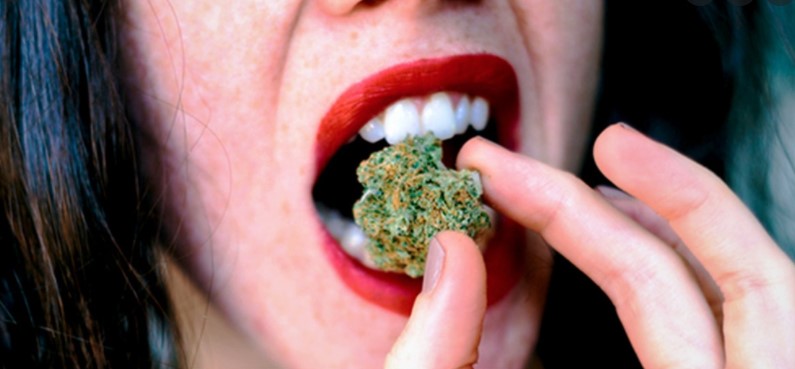
Before consumption, it must undergo the process of “decarboxylation”. Basically, it sheds a carbon dioxide molecule, and it’s only in this state that the THC becomes “active”, ie. fits into the receptors and gets you stoned. So decarboxylation of THC is commonly known as “activation”.
Activation of cannabis does occur under the right conditions at room temperature. If you need to store weed or resin for a long period then it should be in a lightproof airtight container. It’s commonly said that pot stored or “cured” in airtight pots for a few months becomes more potent. However, it’s not enough on its own and one way or another the cannabis is always heated before consumption.
Blaze It
The key to activating THC is to heat it without burning it, which is exactly what vaporizers are all about.
If you burn THC it just turns into carbon dioxide and water. That’s right, the only thing that you’ll get from THC that’s been burned is possibly a slight urge to yawn. So the art is in burning as little as possible and catching the vapour when the cannabis oil evaporates.
Alternatively, if you’re remotely competent in the kitchen, you can heat the cannabis up whilst baking it into food. Almost none of the THC is lost this way, making edible cannabis significantly more potent than smoked.
Purify It
So we’ve established that as a recreational user, the only thing that you’re interested in is the THC. All the traditional and modern methods of preparation are about separating the cannabinoids from the rest of the plant. This is a young cannabis plant, just about ready to go into flower At this stage if there is any THC around it’s certainly not enough to get you stoned or even to feel an effect. The plant is forced to flower by putting it into darkness for twelve continuous hours out of every 24. After 8 to twelve weeks, if all goes well it should look more like this.
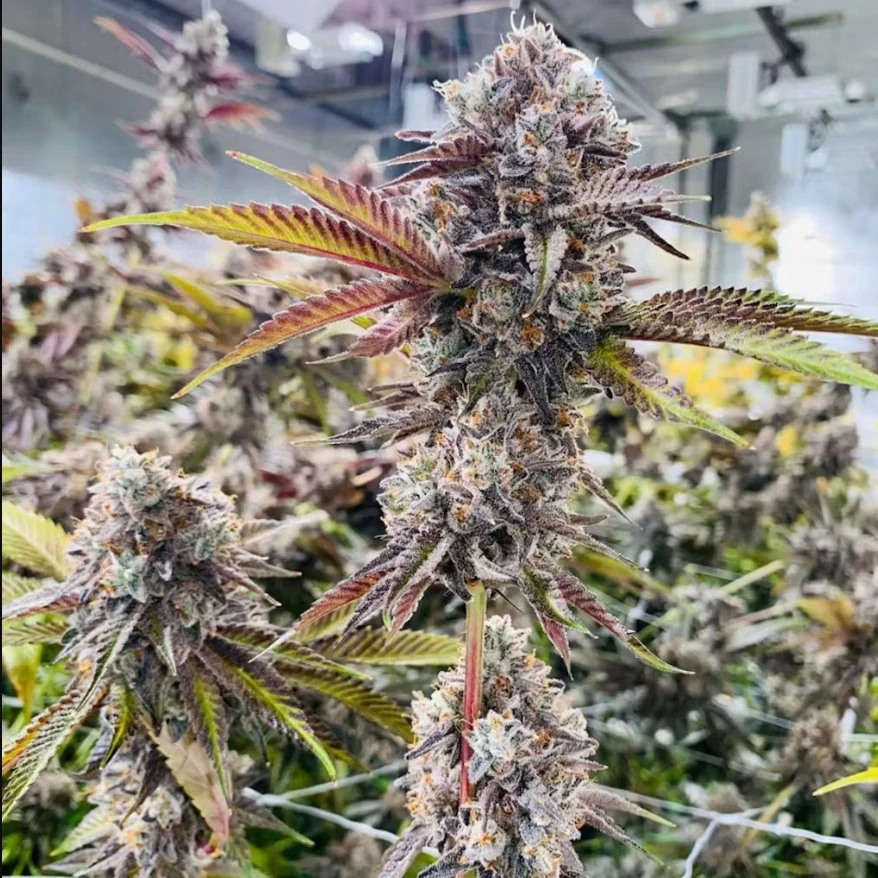
The White bits are the flowering heads, they are the female sex organs and they keep getting bigger and smellier as they get more desperate for attention. If they are grown properly they die virgins, never having had any pollen, never producing any seeds. As they say in Spanish, they are Sin-Semilla (without seed).
Flowering males are complete studs, they could happily impregnate an entire room full of ladies many times over without raising a sweat. If a flowering plant picks up some pollen, the plant stops producing THC and switches over to making seeds. It results in a weak weed full of seeds that pops as it burns.
At the right time, the plants are chopped and they are hung up to dry for 1 to 2 weeks. Those flowering heads should then look something like this
If you look very closely at the picture you can see lots of tiny white hair-like projections. These are called trichomes and this is where the cannabinoids are all produced. They look like hairs and are sticky to the fingers.
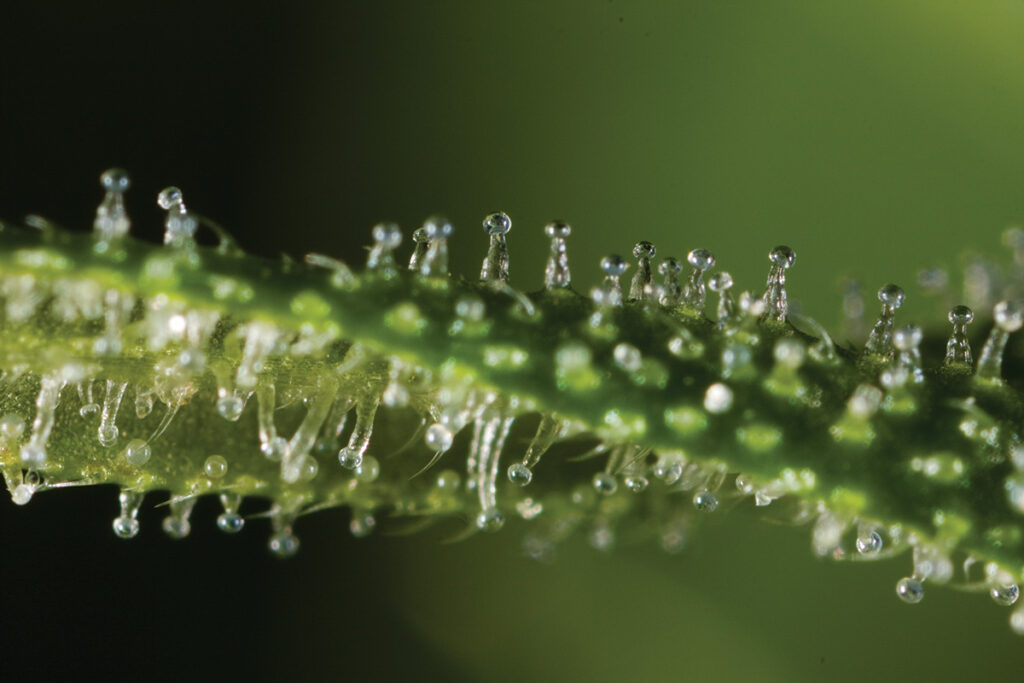
Trichomes
Trichomes cover the surfaces of flowering heads, oozing cannabinoids continuously making sticky buds. They are either shaped like a ball on the end of a stick or just a stick. They are generally translucent but become cloudy as they fill with THC. Trichomes aren’t unique to cannabis, in fact, they exist in one form or another in most species of plants. They provide defence, perhaps, stinging, maybe producing pungent smells or tastes to repel herbivores.
In cannabis, probably as a result of a happy discovery and thousands of years of selective breeding by humans, they produce huge quantities of THC when the plant is flowering. Many arguments have been put forward about the potential evolutionary advantages of THC, but personally, I think as it makes it the only plant that humans will spend thousands creating perfect environments for them to grow anywhere in the world and reproduce by distributing their seeds over the internet through the mail system, that’s more than enough evolutionary advantage to explain it right there.
The trichomes look like this under a basic digital microscope
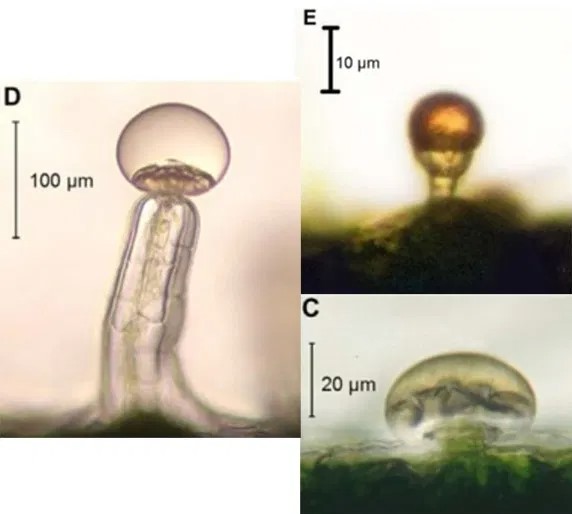
The clear ones are immature trichomes, the heads get cloudy as they fill up with THC. Those cloudy heads are the only bit that you really want. By the time the plant is fully mature and ready to harvest the trichomes will have spread and can be found even on the largest fan leaves and on the stem.
Basic Weed
The flowering heads of sinsemilla, grown indoors and allowed to dry for a couple of weeks is a fair basic standard for weed. If all these conditions are met and the grower was at all competent then this is enough to get even the most hard-core pothead stoned.

Hash
Hash is a mixture of cannabinoids from the trichomes along with terpenes (the smelly bits of cannabis). The trichomes will break off the plant with a little encouragement and can be filtered through screens to separate them from the rest of the plant material. This can be achieved by “tumbling” the cannabis in something similar to a tumble dryer that rolls the weed around and filters out the trichomes. This fine powder is then put into a press, the compression bursts the trichome heads and the oil forms a sticky block of cannabis, usually, like this one, it’s then wrapped in cling film to keep it fresh.
Alternatively, the weed is frozen and then put in nearly freezing water. It’s then agitated for a while and filtered to remove the plant materials. This works well because the trichomes become particularly brittle below 5 degrees Celsius and THC is not soluble in water, so it remains in the trichomes that are caught in the last stage of the filtration process.
This is called bubble hash because the hash looks quite bubbly after it’s been through the filter. Although once it’s been pressed, the only thing that distinguishes its appearance is a slightly greener colour.
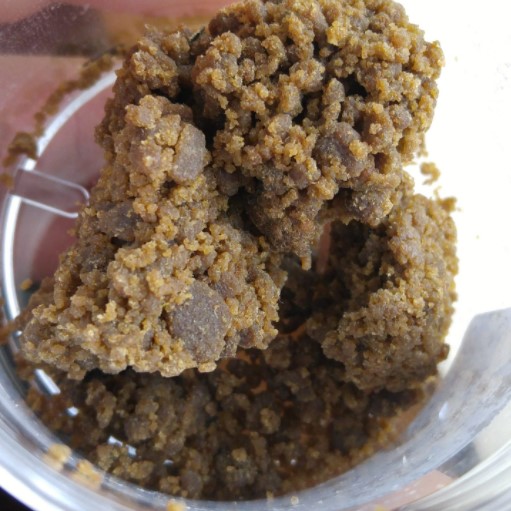
The filters aren’t cheap, but the hash they produce is priceless. Some systems offer half a dozen different filters for different grades of hash. To be honest, these are a bit gimmicky. I’d recommend a three-bag system, the inner bag contains the raw material, the next one has quite a large filter to get rid of plant material, the final one should have a filter of 14microns or less to capture all the trichomes poured through it.
Oil
Unless you’ve got enough equipment lying around to kit out a full biochemistry laboratory, and more than a little expertise, the purest form of THC available to you is oil. This can be anything from 30 to 90% pure THC. The oil is gently heated, sometimes using some very specialized kit, sometimes a nail and inhaled through a straw. The effect is much more intense than any other form of cannabis and even seasoned stoners are often taken by surprise by the strength of their first “dab” as hits of oil are called.
Extraction methods are varied. Many use butane gas to which freezes the trichomes as well as acts as a solvent for the THC. The butane evaporates leaving you with a very pure solution. Unfortunately the butane pools on the floor so a few unfortunate people lose their lives each year by doing this indoors and then blowing themselves up when they ignite the butane.
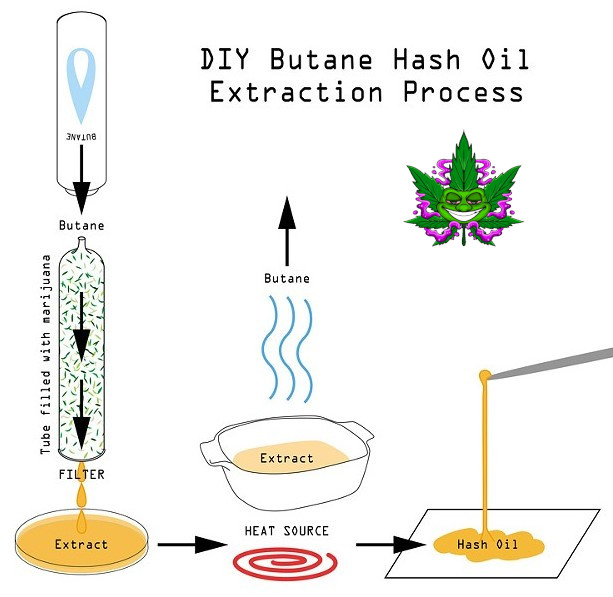
Another new but increasingly popular method is to use hair straighteners. All you need is some weed, hair straighteners, and some parchment paper. Place the nug in the parchment paper and squeeze it with the hair straightener at 300 degrees for 2 seconds. Then collect the bits of oil which can be scraped off the paper.

